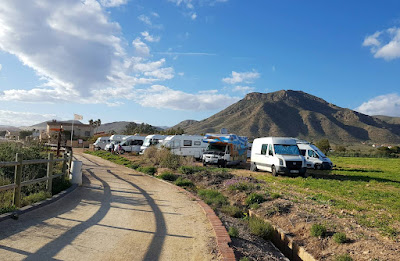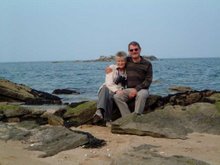We’re at our destination campsite, Los Madriles, where we first came in 2007. Practically all of the surrounding area has been described in past blogs, so this is a compilation of odds and ends that haven’t featured previously.
Climate change is now evident here too. Historically, this
is one of Europe’s driest areas, averaging 8” of rain a year (200mm).The driest
is 50 miles down the coast, where 4” is the average, and is classed as desert.
But it’s changing, and there are many more spring flowers this year. This photo
is of the path down to the beach.
Next example is from the rambla (dry river bed) near the
campsite, that is now a carpet of yellow
flowers. However, In the 19th century there was more rain and this
same rambla supplied enough running water to power a flour mill, the remains of
which are still visible, also the hillsides retain traces of ancient terracing
where crops once grew.
But all is not well in Paradise: there has been a steady increase each year in the number of wild campers. These are motorhomers who park long-term in places that are not campsites, so cost nothing, generally at local beauty spots. What’s the harm, you might say, and maybe for overnighting and on the move, why not. However, for longer stays, disposal of rubbish and toilet emptying is certainly an issue, as is claiming a lovely area and turning it into something resembling a refugee camp.
The photo shows our nearest beach access trail having been “appropriated”. Please note that these aren’t homeless people or folks on a slender budget, the motorhomes referred to are generally newish and costing around £80,000. None of these units are so dilapidated or unsafe as to be turned away at a regular campsite.
 |
Half a mile on from the wild camp settlement, near our campsite entrance, is a field. A ploughed field. Every year it’s the same, a freshly ploughed field, with nothing ever planted or growing in it. The photo shows how difficult it would be to grow anything in that soil – it’s 90% stones! The only possible explanation must be that ploughing it attracts an EU subsidy.
Lots of activities over Easter, especially parades - and not
only religious ones. Here we have a local procession with over 40 different elements,
just two of which are shown in the following photos. All the costumes were
incredibly intricate and imaginative.
Now for the walk that never was. John and I decided to
follow a path we’d never tried before: a steep but well marked trail up the
side of a mountain. Panoramic views as we ascended.
First rule of climbing is that steep climbs get steeper. We
ran out of steam a few hundred metres from the top, where John’s sitting in the
photo. We realised we should have kitted out with oxygen tanks but in the local
area they’re only available with scuba diving kits. Shame – but you’d pay good
money to see a couple of octogenarian frogman, complete with masks and
flippers, plodding up a precipitous hillside.







